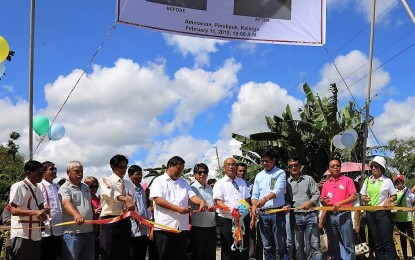
The Catabbogan-Wagud farm to market road was opened on February 11 as part of the 24th Kalinga foundation day and 3rd Bodong festival. The road is expected to further boost Kalinga’s coffee industry with the access road leading to the coffee plantation and production areas. The activity was led by provincial agriculture officials and local executives. (Photo courtesy of DA-PRDP)
TABUK CITY, Kalinga-- Kalinga’s coffee industry continues to boom, especially with more road projects leading to the farms and processing facilities being constructed and opened, a provincial government official said Tuesday.
“There was a ceremonial opening of the road that leads to coffee production area. Opening and paving the road will give an easy access to the coffee plantation and production sites,” Domingo Bakilan, Kalinga provincial agriculturist and provincial project management and implementing unit (PPMIU) head, told the Philippine News Agency (PNA) in an interview.
The 13.2-kilometer road project of the Department of Agriculture-Philippine Rural Development Project (DA-PRDP), with a project cost of PHP217 million, will benefit 1,428 households or 7,712 population in eight barangays-- five in the town of Pinukpuk and three in Balbalan town.
The road project covers barangays Catabbogan, Malagnat, Taggay, Ammacian and Wagud in Pinukpuk and Barangay Sacpil in the municipality of Conner, Apayao, aside from Balbalan.
“Marami pang kape sa Balbalan lalo na sa (There are still lots of coffee in Balbalan especially in) barangay Mabaca, Buaya at Talalang,” Bakilan said.
Bakilan said the DA-PRDP project is 80 percent funded by the World Bank (WB), 10 percent by the national government, and 10 percent by the provincial government.
"It is currently almost 90 percent complete and is expected to be accomplished by March 26. It is five meters wide and eight inches thick which can allow trucks carrying loads of coffee to pass,” Bakilan said.
On February 11, the DA-PRDP held a ceremonial opening of the Catabbogan-Wagud Farm-to-Market Road (FMR) located along the “Cal-owan line”.
The project is the third implemented FMR sub-project of the province in support of the local coffee industry.
In 2018, the province turned over two PRDP supported FMR sub-projects and one enterprise sub-project to boost the coffee industry of the province.
These are the improvement of Banneng-Gombowoy FMR in Tanudan, the improvement of Bulanao-Amlao FMR in Tabuk City.
Through the DA-PRDP, the coffee trading center of the Kalinga Integrated Coffee Processing and Marketing Enterprise in Tabuk City was also completed.
Better access to the coffee center
“For several decades, it takes a longer time walking than riding a vehicle when travelling to Tabuk City from here,” Elvy Taquio of the Information, Advocacy, Communication and Education (InfoACE) unit of the PRDP said, quoting the statement of Domingo Lagayon, Malagnat, Pinukpuk barangay chairman.
She said Lagayon, whose barangay has among the biggest population in Pinukpuk town, was also grateful for the construction of the road, which will benefit residents and boost the coffee industry.
The other village chiefs in the areas covered by the project also committed to maintain the road, she added.
Taquio said Pinukpuk mayor Irving Dasayon also shared the Lagayon sentiment regarding the road improvement.
Danilo Daguio, DA-PRDP deputy project director and DA-Cordillera Assistant director for Operations, said cooperation among beneficiaries, strong support from local officials, and strong and effective governance contributed to Kalinga’s implementation of PRDP sub-projects.
“If there is a good road, more support services and opportunities will follow,” Daguio said.
Out of the 51 projects, worth PHP2.4 billion, approved in the Cordillera, 31.76 percent or PHP775 million was allotted in Kalinga for five major projects.
The PRDP, a six-year national project under the DA and jointly funded by the World Bank, national government and local government units, aims to establish a modern and climate-resilient agriculture and fisheries sector. It provides infrastructure, facilities, technology and information to raise incomes, productivity and competitiveness in targeted areas.
The projects include farm-to-market roads, bridges, slope protection, tramline, communal irrigation systems and potable water system. (PNA)
 The Philippine News Agency is a web-based newswire service of the Philippine government under the supervision of the News and Information Bureau (NIB) of the Presidential Communications Office (PCO).
The Philippine News Agency is a web-based newswire service of the Philippine government under the supervision of the News and Information Bureau (NIB) of the Presidential Communications Office (PCO).